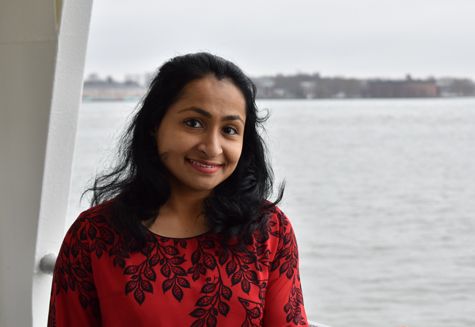Early Career Scientist Spotlight
Dr. Remya Bhanu
Space Physicist
Geospace Physics Laboratory
What is your research focus?
My primary research focus is to understand the electrodynamics of the Earth’s magnetosphere, a cavity-like region surrounding the Earth where the Earth’s magnetic field dominates and influences charged particle motions. Of particular interest to me are various electromagnetic waves generated within the Earth’s magnetosphere and how they interact with charged particles of different energies, thereby governing the complex magnetospheric dynamics. Several satellite missions have been deployed to understand such complex phenomena, ever since the beginning of the space age. Starting with NASA’s Explorer mission series to recent missions like NASA's Time History of Events and Macroscale Interactions during Substorms (THEMIS), ESA’s (European Space Agency) Cluster, NASA’s Van Allen Probes and Magnetospheric Multiscale (MMS) satellites, JAXA’s Arase, these missions have all been specifically designed to study the Earth’s magnetosphere. I examine observational data from several of these missions to study and understand the magnetospheric electrodynamics using theoretical and data analysis techniques.
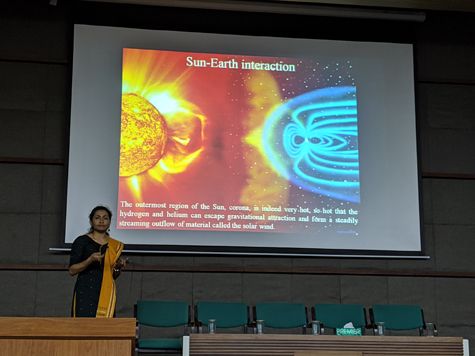
Credit: Local Organizing Committee, 2019 PSSI Plasma conference
How did you end up working at NASA Goddard?
During my Ph.D. at the Indian Institute of Geomagnetism, I always dreamt of working at NASA, though I did not know how exactly I was going to achieve this. After my Ph.D., while I was still looking for postdocs, I fortuitously happened to meet one of the senior scientists, Dr. David Sibeck, from NASA Goddard during the 2014 American Geophysical Union Fall meeting. Though it was a very brief discussion, our research interests matched and David agreed to be my advisor for a NASA Postdoctoral Program (NPP) Fellowship at Goddard. I applied for it for the first time while I started my postdoc at Academia Sinica in Taiwan. Although my first NPP application was not selected, I was offered to work at NASA Goddard for a short term, after my postdoc in Taiwan. NASA’s Van Allen Probes mission was successfully returning years of data and I worked on exploring the data to study electromagnetic waves in the Earth’s radiation belts. This was an excellent opportunity for me to work, interact, and collaborate with eminent scientists at Goddard. I can say that was the best and most wonderful experience of my career (thanks to the marvelous team at Goddard!). After my short visit, I wished to return to Goddard and hence re-applied for an NPP fellowship. This time, I was fortunate enough to succeed. However, due to COVID-19 travel restrictions, I had to wait several more months before I started my fellowship in November 2020.
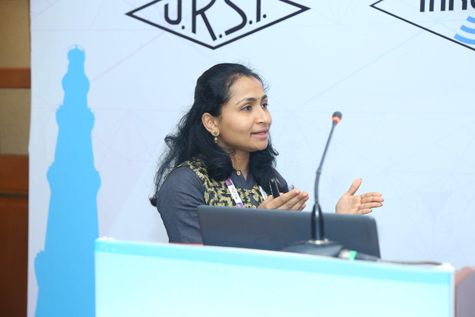
Credit: Local Organizing Committee, URSI AP-RASC 2019
Did you always know that you wanted to be a Space scientist?
Actually, no. I dreamt of being a medical surgeon throughout my middle and high school education. I visualized myself being a doctor and serving the community. It took me until the end of high school to realize that I did not have the vocation to be a doctor and that physics and chemistry were the subjects that captivated me most. I can say that I finally listened to my calling following high school, when I started my undergraduate B.Sc. in Physics.
Though space and astrophysics always fascinated me, it took me a couple of years to select space physics as my career path. I enjoyed learning the concepts of electrodynamics, and the first opportunity that I got to work as a summer intern was on solid-state physics, to develop nanomanganites. The topic was interesting, but when I got an opportunity to pursue a Ph.D. in space physics, I did not give it a second thought.
Tell us about one project of yours that has been particularly impactful in your field.
That would be my first research paper. In this study, we tackled a long-standing mystery of the competition between the two prevailing instabilities in the Earth's magnetosheath region, mirror and ion cyclotron instabilities. While theory suggested dominance of ion cyclotron instabilities, observations found that mirror modes are dominant in the Earth’s magnetosheath. Using linear kinetic theory, analytical and numerical methods, we found that the presence of electron temperature anisotropy significantly alters the wave growths, decreases the ion cyclotron instability, and increases the mirror instability growth rates. The process is predicted to be plasma β-dependent. This finding explained dominant mirror structures found in high beta magnetosheath and low beta magnetopause regions. I particularly mentioned this paper because it was for this work that I received positive comments and appreciation from many of the senior scientists in our field and I also won the Committee on Space Research (COSPAR) 2018 Zeldovich medal.
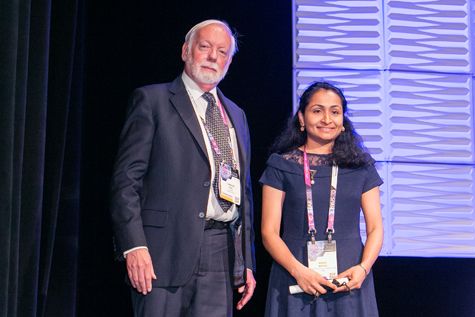
Credit: Local Organizing Committee, COSPAR 2018
What early career advice do you have for those looking to do what you do?
Never lay a barrier between you and your dreams and do not let anyone else choose your path for you. Believe in yourself, no matter what or how big your dreams are, strive hard, and believe you will succeed! Choosing research as a career was not an easy decision for me to make but I chose to take it in spite of all the discouraging and dispirited remarks I was told. I must admit that I also had a handful of supporters, which included my parents, who always believed in me. I chose to stand up to fight for my dreams.
I believe it’s important to grab opportunities, however small they may seem, especially during undergraduate/postgraduate courses. Take part in summer projects/internships that national laboratories and universities offer. That could be your first step up the ladder, like it was for me. Know your self-worth, be aware of both your strengths and weaknesses, and accept them without fear of being judged.
What do you like to do in your free time?
I am an ardent lover of Indian dance forms. Music gets my foot tapping. Although I am trained in Indian classical dance called “Bharatanatyam”, I love to dance to any music. Even while I am doing my household chores and cooking, I have songs (mostly Indian movie songs) playing in the background and I’m moving to it. My husband gets worried that I may run into something and hurt myself, but I guess I enjoy dancing whenever I find time. Apart from dance, I also enjoy travelling.
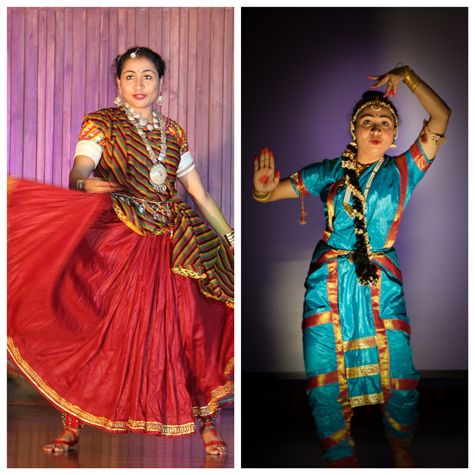
Credit: B.I. Panchal
What do you enjoy the most about your job?
My job allows me to associate and collaborate with some of the top scientists in my field. Every small discussion helps me learn something new. The discussion may or may not be exactly within my field, but I do enjoy participating. The interactions are all via tele/video conferencing right now, due to COVID-19 mandatory telework, so I do miss the usual face-to-face and lunchtime discussions at Goddard. Moreover, I feel this is the most relaxing job, where I totally enjoy what I do while keeping my learning curve active. I feel contented to have made the right decision in choosing my career.
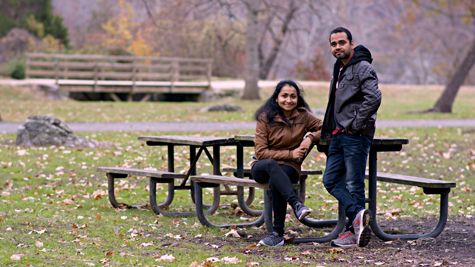
Credit: Ankush Bhaskar
What are your future research interests and goals?
I have a lot to learn! I would like to expand my knowledge and understanding of plasma waves and instabilities and how they interact with energetic charged particles in different space plasma environments. If I ever get a chance, I would like to be part of a space mission, even if it is a small satellite/CubeSats mission, so that I can acquire some knowledge about satellite instrumentation. I look forward to that wonderful experience. Ultimately, I would like to impart whatever little knowledge I have to the younger generation, especially to underprivileged students. I understand it is a long way to go!
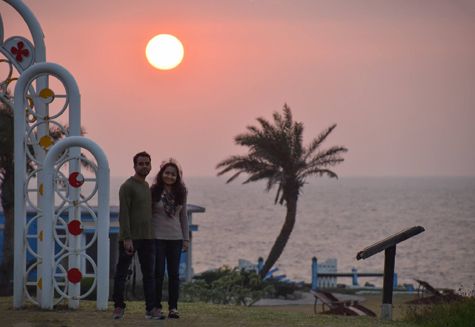
Credit: Suresh Vegiraju
Biography
Home Town:
Kerala, India
Undergraduate Degree:
B.Sc. Physics, Government. Victoria College, Palakkad, Kerala, India
Post-graduate Degrees:
M.Sc. Physics, PSG College of Arts & Science, Coimbatore, Tamil Nadu, India
Ph.D. (Physics - Space Physics), Indian Institute of Geomagnetism (IIG) (Affiliated to University of Mumbai), Maharashtra, India
